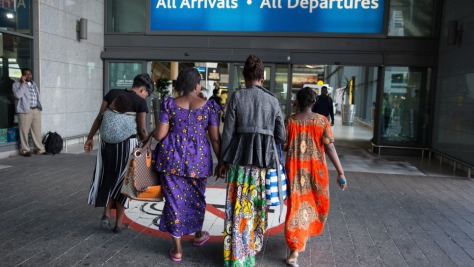Ethiopia: Somali refugees to be relocated away from border
This is a summary of what was said by UNHCR spokesperson Jennifer Pagonis – to whom quoted text may be attributed – at today's press briefing at the Palais des Nations in Geneva.
In Ethiopia today (Friday), UNHCR teams are expected to start relocating a group of 500 newly-recognized Somali refugees who fled from renewed conflict in strife-torn south and central Somalia over the last year. They have been staying around the Kebribeyah area, near the Somali border in eastern Ethiopia and are being relocated to a re-opened UNHCR camp at Teferi Ber.
The refugees are part of a group of 4,000 Somali refugees who have recently been granted refugee status by UNHCR and the government's Authority for Refugees and Returnees Affairs (ARRA). An estimated 7,000 additional Somalis who also claim to have fled fighting and insecurity in Somalia, are waiting to be screened at other sites in eastern Ethiopia.
The new camp site at Teferi Ber, some 120 km north of Kebribeyah, was formerly a UNHCR camp which in the 1990s hosted some 49,000 mainly Somalis refugees who had fled fighting in their country. The camp was officially closed in 2001 after all the refugees returned, mainly to the self -declared republic of Somaliland.
After arriving at Teferi Ber, the refugees will spend three days in a reception centre where they will be allocated plots of land to construct homes and given building materials. They will also be given food as well as tarpaulins, blankets, sleeping mats, kitchen sets, jerry cans, kerosene stoves, and soap. The ARRA has established a temporary health centre until permanent structures can be built.
The Somali Region of Ethiopia already hosts more than 16,500 refugees. With the new arrivals, the total is 20,300. At the peak of the Somali refugee crisis in the early 90s, the region hosted 628,000 refugees in eight camps. The overwhelming majority went home between 1997 and 2005, and all of the camps were closed except a camp at Kebribeyah.
Related news and stories
Thousands of newly arrived Somali refugees in Ethiopia relocated to new settlement
Samira's Story
Drought brings life-threatening food shortages for refugees in Ethiopia
100,000 new Somali refugees arrive in Ethiopia in the past month, UN and partners are calling for urgent funding
UNHCR teams and partners rush assistance to some 100,000 newly arrived Somali refugees in hard-to-reach area of Ethiopia
As the Horn of Africa drought enters a sixth failed rainy season, UNHCR calls for urgent assistance
-

A shell blast, and an asylum seeker's life changed forever
27 Jan 2021 After sustaining life-changing injuries during clashes in Libya, Sudanese asylum seeker Mohamed is adapting to disability with support from UNHCR and its partner. -

As Sub-Saharan crises force more to flee, UNHCR calls for stronger Mediterranean route response
27 Jan 2021 -

Climate change and conflict pursue displaced Burkinabes
25 Jan 2021 In Burkina Faso, the displaced struggle to find a refuge from violence and the effects of global heating. -

With refugee resettlement at a record low in 2020, UNHCR calls on States to offer places and save lives
25 Jan 2021 -

Climate change and conflict, double burden for displaced Burkinabes
25 Jan 2021 -

Over 100,000 displaced by resurgence of violence in Sudan's Darfur region
22 Jan 2021 -

2019 DAFI Annual Report Summary
22 Jan 2021 This document summarizes key scholarship, outcome, and funding metrics for the DAFI scholarship programme from 2019. It emphasizes the tremendous growth of the DAFI scholarship programme over the last five years and how this programme will continue to mobilize and carve out opportunities in higher education for young refugee women and men in striving towards UNHCR's goal to increase the enrolment of young refugees in higher education from 3% to 15% by 2030. -

Grim milestone as Sahel violence displaces 2 million inside their countries
22 Jan 2021 -

Sahel internal displacement tops 2 million as violence surges
22 Jan 2021 Grim milestone reached in world's fastest-growing displacement crisis as fighting uproots 11,400 within Burkina Faso.
